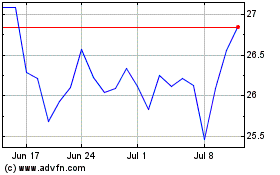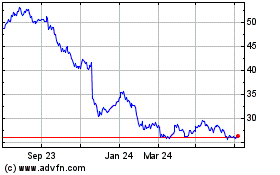Bayer Agrees With Decision to Pull Part of Roundup Settlement--Update
July 08 2020 - 4:59PM
Dow Jones News
By Sara Randazzo
Bayer AG is scrapping a $1.25 billion proposal for resolving
future lawsuits over whether its Roundup weedkiller causes cancer,
highlighting the difficulty of settling litigation over a product
still on the market.
The snag doesn't affect deals worth up to $9.6 billion that
Bayer reached with lawyers representing tens of thousands of
plaintiffs who blame Roundup for making them sick. It does,
however, call into question how the German conglomerate will ever
fully put to rest the Roundup liabilities it inherited when it
purchased seed and pesticide maker Monsanto Co. in 2018.
Bayer had asked a federal judge in San Francisco to approve a
unique type of class action that would dictate how people can sue
the company in the future over claims that Roundup causes
non-Hodgkin lymphoma. The proposed class action depended on the
creation of a panel of scientists that would definitively conclude
whether Roundup and its active ingredient, glyphosate, are
carcinogens.
U.S. District Judge Vince Chhabria said this week he was
skeptical that a science panel could fairly replace judges and
juries in the case, and that he was unlikely to sign off on the
idea. "Although the court is not aware of any Plan B, it would be
surprising if none existed given the stakes involved and the
novelty of Plan A," the judge wrote after expressing his
concerns.
Bayer and plaintiffs' lawyers said Wednesday they will work on
refining the idea and bring it back to the judge.
Elizabeth Cabraser, a well-known class-action expert
representing the plaintiffs, said they "remain strongly committed
to a fair and just resolution." Bayer echoed that, saying it will
seek "a viable solution to manage and resolve potential future
litigation."
Bayer plans to continue selling Roundup with no change to its
label for use in commercial farming and everyday gardening. But
doing so makes it difficult for the company to fully contain
lawsuits filed over Roundup's safety since people who use the
product today could get sick years from now and try to blame
Bayer.
The Environmental Protection Agency and other regulators have
said glyphosate doesn't cause cancer. Three California juries,
meanwhile, have concluded that Roundup caused plaintiffs' illnesses
and awarded large verdicts.
Legal observers say a backup plan that meets the judge's
approval could take a few forms, including allowing the science
panel to conduct new research rather than simply analyzing existing
studies. "In an area where the science may be evolving, how could
it be appropriate to lock in a decision from a panel of scientists
for all future cases?" Judge Chhabria wrote in his order. Bayer
could also alter a proposal it made to monitor current Roundup
users to see if they develop non-Hodgkin lymphoma, to better use
that monitoring to come up with new research.
Another option, said University of Connecticut law professor
Alexandra Lahav, is to simply wait for decisions in the appeals
that Bayer is pursuing in the three Roundup cases that have gone to
trial. Those appeals rest on the idea that the jury verdicts are in
direct contrast with the conclusions of the EPA, which has told
Bayer it can't put a cancer warning label on the weedkiller since
the agency determined the product isn't carcinogenic.
The problem for companies trying to resolve any mass tort, Ms.
Lahav said, is how to put an end date on liability. "What is a way
to cabin it and control it, while still being fair to people?" she
said.
As Bayer works to recast the class-action proposal, it continues
to negotiate with lawyers who have existing cases. At the time of
its June settlement, Bayer said it had settled with lawyers
representing 75% of the 125,000 known plaintiffs and had set aside
between $8.8 billion and $9.6 billion to cover the entire batch of
existing claims.
Plaintiffs' lawyers unsatisfied with settlement offers,
meanwhile, are still signing up new clients. Legal marketers say
television advertisements urging Roundup users with non-Hodgkin
lymphoma to call the number on the screen continue to air around
the country.
"There is no recall. There is no label change," a narrator says
in an advertisement airing this week sponsored by the Goldwater Law
Firm. "So why all these lawsuits? If you have non-Hodgkin's
lymphoma, we have information to help you decide how to move
forward."
--Micah Maidenberg contributed to this article.
Write to Sara Randazzo at sara.randazzo@wsj.com
(END) Dow Jones Newswires
July 08, 2020 16:44 ET (20:44 GMT)
Copyright (c) 2020 Dow Jones & Company, Inc.
Bayer (TG:BAYN)
Historical Stock Chart
From Mar 2024 to Apr 2024

Bayer (TG:BAYN)
Historical Stock Chart
From Apr 2023 to Apr 2024
